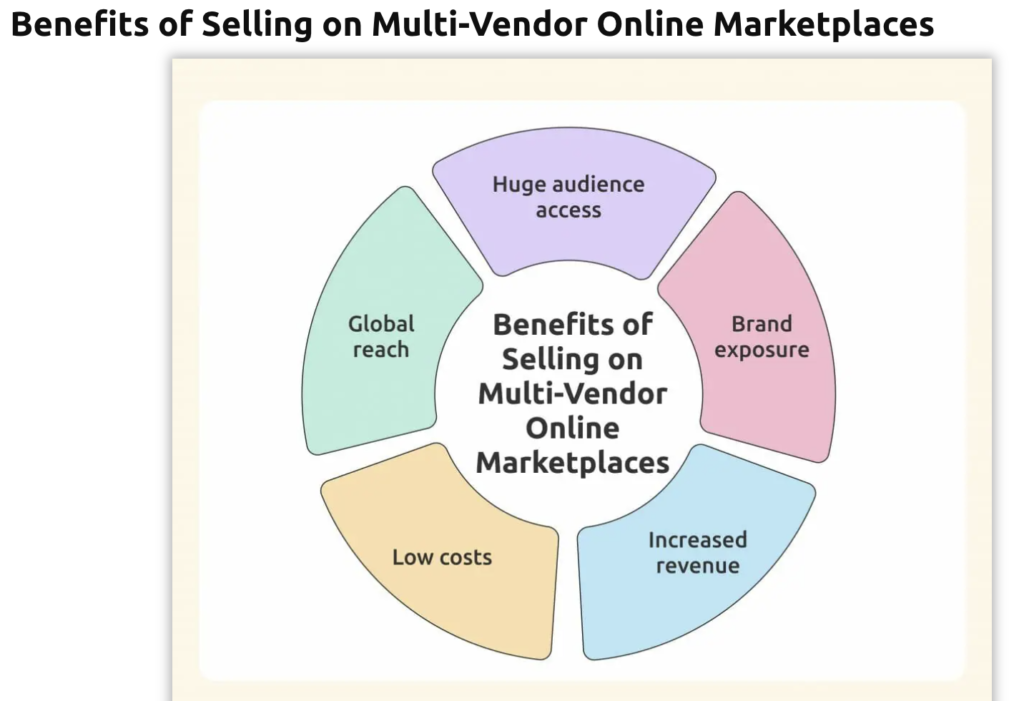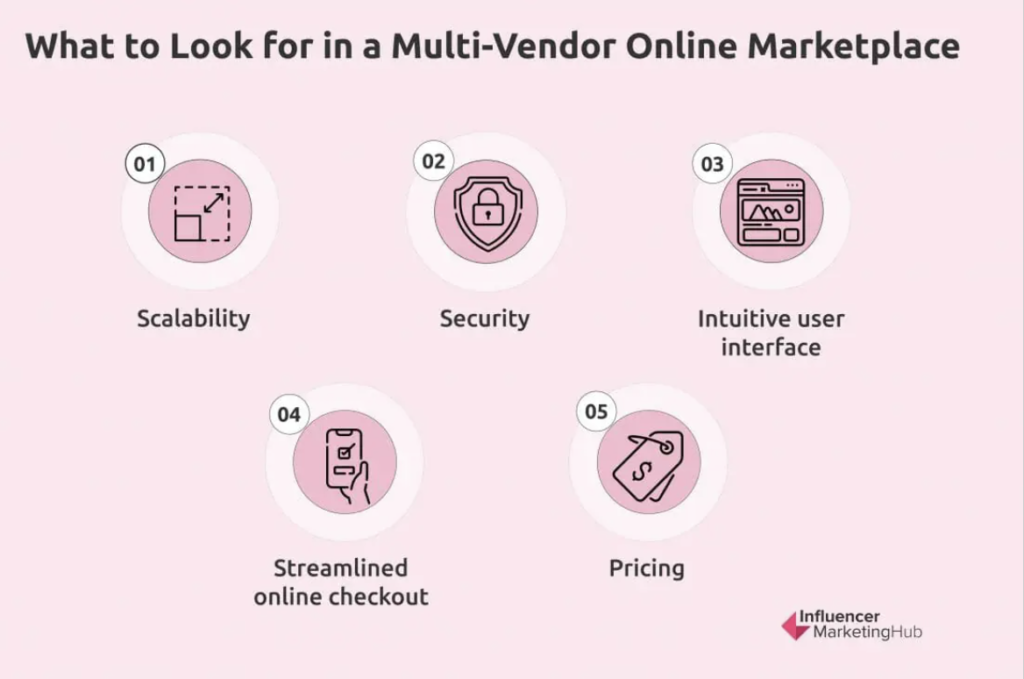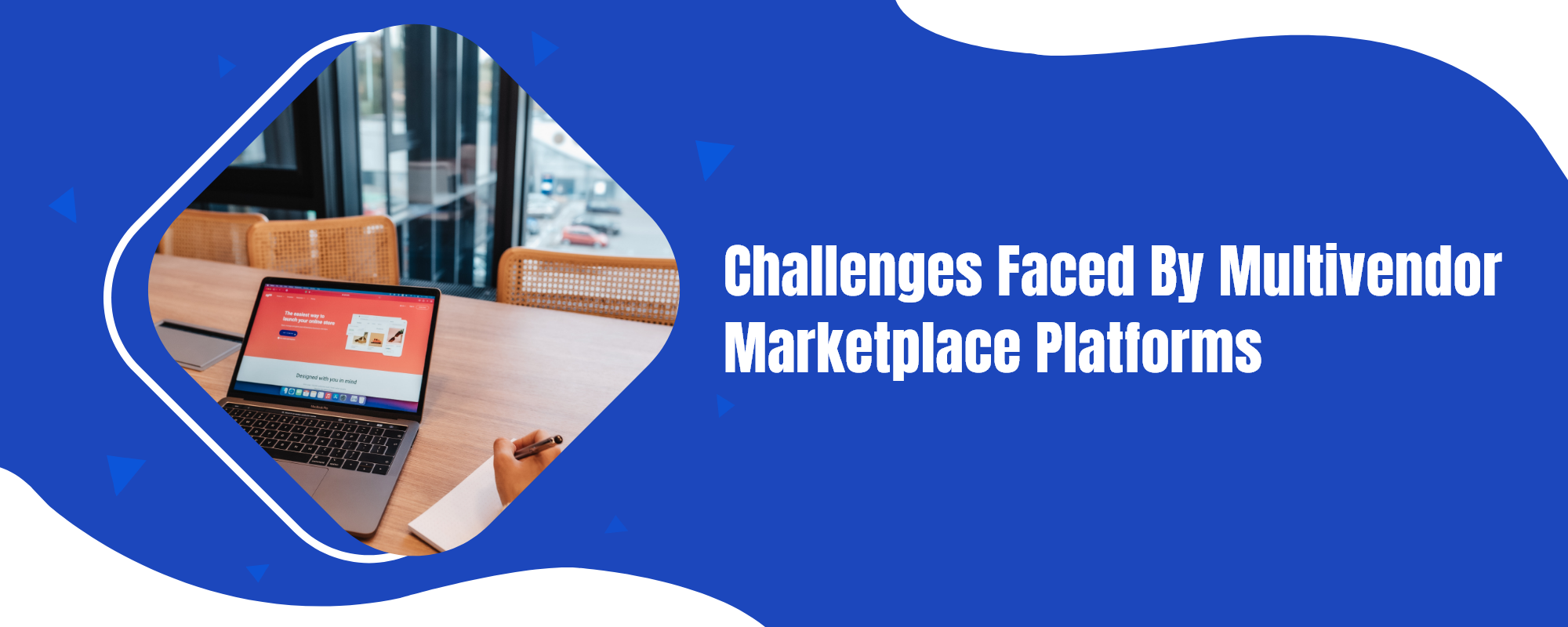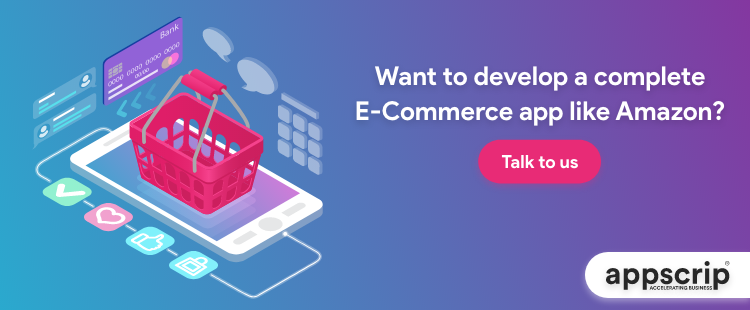The multivendor marketplace connects buyers with several individual sellers.
Multivendor marketplaces are platforms that make it possible for people to exchange goods and services on it. Popular multivendor marketplaces are Dokan, Airbnb, Shopify, Etsy, and Fiverr.
Usually, a multivendor marketplace doesn’t manufacture the products they sell or own inventory, but it takes the role of a intermediary and connects buyers with products or services made available by a seller network. There are many challenges faced by multivendor marketplace platforms, which we shall discuss here and along with possible solutions.
In recent years, multivendor marketplace platforms have gained immense popularity among entrepreneurs and consumers alike. These platforms allow multiple vendors to sell their products on a single website, providing customers with a wide range of options and vendors with a broad customer base.

Challenges Faced By Multivendor Marketplace Platforms
Despite several benefits being provided by multivendor marketplace platforms, they face many challenges that deem it difficult to maintain the platform’s integrity, attract customers, and generate revenue. In this blog, we will explore some of the most significant challenges faced by multivendor marketplace platforms.
Adverse situations caused by the pandemic has taught us the true value of technology. How technology turned out to be a blessing? How technology helped us get over loneliness? How it offered us convenient purchasing options right from our homes? We shall provide you answers to all of the above questions.
Here we shall discover the challenges faced by multivendor marketplace platforms and e-commerce challenges. We shall also walk you through the escense of customer support, vendor management, payment and transaction issues, shipping and logistics.
What is a Multi-vendor marketplace platform?
A multivendor marketplace platform is where multiple vendors can sell their products or services. They act as mediators connecting buyers with products or services from a seller’s web.
The pandemic had us locked in our homes, due to which we took recourse to online habits. Hence, now when we need to purchase any product, inadvertently we seek them on popular multivendor marketplace platforms.
And these marketplaces have spoiled us for the choice they offer. They are the first ones we reach out when we need any items be it clothing, fashion accessories, electronics, household goods, and more.
Interesting facts
- When a consumer is looking to make an online purchase, about 48% of online shoppers go directly to multivendor marketplaces
- About 47% of global online purchases are done through online marketplace platforms
- During the pandemic, there was 40% rise in sales for the top 50 marketplaces
- About 14% of first-time online buyers opt to shop on an online marketplace

Challenges Faced By A Multivendor Marketplace Platform & Ways To Overcome It
Marketing and user acquisition are among the most imperative factors that a marketplace seeks to excel in. Ways to market and attract buyers to marketplaces are many, such as:
- By offering credit
- By creating a referral program
- By including offers for early registrations
- Using social media to enhance sales
- Efficient email marketing
- By advertising on the platforms effectively
1. Vendor management
Operating a multivendor marketplace platform equates to handling multiple vendors. This can turn out to be a tough nut to crack. Managing sales, inventory, and shipping of all vendors require the right kind of tech support.
Solution
Experienced technical expertise should be opted for to ensure efficient and proper vendor management.

2. Payment and transaction issues
Payment gateways are crucial in processing payments and concluding purchases. Moreover, customers prefer to have multiple payment alternatives.
If there aren’t enough options, then some customers when facing issues with the few available options, may back out of a sale. This is among the top challenges faced by multivendor marketplace platforms.
Solution
By imbibing mass payments feature that automatically divide the payment and distributes it among vendors. Ensure that the payment system abides by standards, laws, and regulations. It should comply with Know Your Customer (KYC) and Anti-Money Laundering (AML) requirements
3. Quality control
Multivendor owners are responsible for product quality, product images, reviews, shipping, and logistics to ensure expansion or growth. But, controlling the quality of products can be a difficult task.
Ensuring vendors meet specific quality standards can be a daunting task for multivendor marketplace platforms. Each vendor may have their own quality standards, and to ensure they are all aligned with the platform’s standards can be challenging.
Solutions
The platform must develop strict quality control processes, including checks on product descriptions, images, and reviews, to maintain the quality of the products they sell.
Design a quality control checklist. Ensure that the products meet company standards. Highlight those standards that your vendors are required to meet. This will ensure that the product meets the customers’ expectations.
4. Competition and pricing
Vendors usually cut down prices to compete with their opponents and gain customers. However, it can have a negative influence on the profits of the marketplace.
Therefore maintaining the price, holding on to the margin set on each product and beating the competition are some of the major challenges faced by multivendor marketplace platforms.

Solutions
Execute innovative pricing strategies with inbuilt features and tools of the platform. This personalises prices based on customer demographics, spending habits, interactions of customers with the website, and shopping channels
5. Customer support, trust and safety
Providing the right customer support is another challenge. The pre/post support that the vendors give to customers can play a prominent role to ensure the loyalty of a customer to their website/app. It decides the growth of your e-commerce site.
It can build trust and reliability or tarnish it forever. It can enhance the public persona that your business holds. Hence, one has to be extra vigilant about it.
One of the most significant challenges faced by multivendor marketplace platforms is building trust and ensuring safety for both customers and vendors. Since multiple vendors sell on a single platform, there’s a risk that some vendors may not be legitimate, leading to issues such as fake products, scams, or fraud.
Solution
To address this challenge, multivendor marketplaces must implement strict verification processes to ensure that all vendors are legitimate and that the products they sell are genuine. Additionally, they must provide a secure payment system to protect both the customers and vendors.
6. Platform Maintenance and Support
Maintaining a multivendor marketplace platform requires a lot of resources, including a robust infrastructure, technical support staff, and regular software updates.
Solution
The platform must have a dedicated team to manage its operations, monitor its performance, and resolve any technical issues quickly. Providing ongoing support to vendors and customers is also essential to ensure a smooth buying and selling experience.
7. Competition and pricing
Challenges faced by multivendor marketplace platforms include stiff competition from other e-commerce platforms, including large marketplaces like Amazon and eBay.
Solution
To compete effectively, multivendor marketplaces must develop a unique value proposition, provide exceptional customer service, and create a positive user experience. They must also offer competitive pricing, incentives, and promotions to attract and retain vendors and customers.
8. Marketing and user acquisition
Building a multivendor marketplace platform requires significant investments in marketing and promotion to attract vendors and customers.
Solution
The platform must develop a robust marketing strategy to promote its brand, attract new vendors, and engage with customers. This includes implementing effective search engine optimisation, developing social media campaigns, and investing in paid advertising.

9. Store performance
Some challenges like higher page loading speed, accessibility issues, and other technical concerns could encourage customers to switch to other stores. Keeping the mobile experience hassle-free can also be difficult especially when there are so many products, categories, and information pages.
Solutions
Ensure the load time of your website is within set limits. Coordinate with your developers to ensure a UX-rich mobile experience and make sure there’s good store performance.
10. Avoiding analytics data
Many vendors face issues with business expansion since they are not aware of how to capitalize on analytics data.
Solutions
Assessing the performance of your multivendor store facilitates taking into account critical performance, marketing, and UX decisions. Create your multivendor platform on a builder that ensures powerful analytics.
11. Fraud prevention and security
One of the biggest e-commerce challenge is fraud prevention and security. E-commerce retailers dealt with an average of 206,000 web attacks every month. In 2020, global payment fraud rose to $32.39 billion.
One should not forget that running a multivendor marketplace means hosting multiple vendors on your website. This paves the way for more fraud, making you responsible for it.
Solutions
When it comes to data safety, prevention is better than cure. Thus, Data Loss Protection (DLP) solutions, multiple layers of security, the Payment Card Industry Data Security Standard (PCI DSS) should be inculcated.
A reliable and capable web development team is the only means to implement the above prevention programs.
12. Platform scalability
Platform scalability is imperative for multivendor marketplace expansion. It enables more people to use the application by expanding it to meet their growing requirements.
Solutions
In order to make a scalable platform,
- Select a horizontal scale over a vertical one
- Design Process automation and maintenance

How to Overcome these challenges?
-
Add value
Focus on the USP of your marketplace and how you can make your application more user-friendly.
-
Use tried and tested multivendor functionality.
Try using already existing successful business models and integrations that are ready for use.
-
Utilise effective technology
Maintain a fully operational and easy-to-use website. Leverage software tools to enhance business growth.
Conclusion: Challenges Faced By Multivendor Marketplace Platforms
Multivendor marketplace platforms offer tremendous potential for entrepreneurs to create new opportunities and for customers to access a wide range of products.
However, these platforms face several challenges, including building trust and safety, maintaining quality control, providing ongoing support, competing with other e-commerce platforms, and investing in marketing and promotion.
By addressing these challenges, multivendor marketplace platforms can create a sustainable business model that benefits both vendors and customers alike.
Entrepreneurs looking to get into the e-commerce business niche. Connect with Appscrip today to beat the common challenges of running a multivendor platform with our e-commerce multivendor white labelled software.
After an Engineering degree and a Diploma in Management I devoted 16+ years working in the automotive industry. My innate skill and extreme passion in writing, encouraged me to adopt it up as a profession. I have been writing for more than 10+ years in the software industry. The 400+ blogs I published are informative, exhaustive and interesting to a professional and causal reader.










